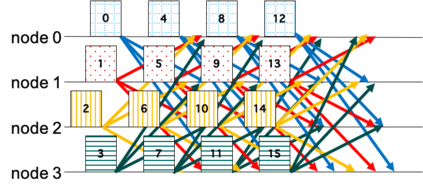This paper presents Mir-BFT, a robust Byzantine fault-tolerant (BFT) total order broadcast protocol aimed at maximizing throughput on wide-area networks (WANs), targeting deployments in decentralized networks, such as permissioned and Proof-of-Stake permissionless blockchain systems. Mir-BFT is the first BFT protocol that allows multiple leaders to propose request batches independently (i.e., parallel leaders), in a way that precludes request duplication attacks by malicious (Byzantine) clients, by rotating the assignment of a partitioned request hash space to leaders. As this mechanism removes a single-leader bandwidth bottleneck and exposes a computation bottleneck related to authenticating clients even on a WAN, our protocol further boosts throughput using a client signature verification sharding optimization. Our evaluation shows that Mir-BFT outperforms state-of-the-art and orders more than 60000 signed Bitcoin-sized (500-byte) transactions per second on a widely distributed 100 nodes, 1 Gbps WAN setup, with typical latencies of few seconds. We also evaluate Mir-BFT under different crash and Byzantine faults, demonstrating its performance robustness. Mir-BFT relies on classical BFT protocol constructs, which simplifies reasoning about its correctness. Specifically, Mir-BFT is a generalization of the celebrated and scrutinized PBFT protocol. In a nutshell, Mir-BFT follows PBFT "safety-wise", with changes needed to accommodate novel features restricted to PBFT liveness.
翻译:本文介绍Bir-BFT(Mir-BFT),这是一个强大的Byzantine断层耐受力(BFT)总体广播协议,旨在最大限度地扩大广域网络(WANs)的输送量,针对分散网络的部署,例如允许和允许获取的校准链链系统。Mir-BFT是第一个BFT协议,允许多个领导人独立地(即平行领导人)提出批次请求,从而避免恶意(Byzantine)客户要求重复袭击,办法是将分散式请求的散装仓位分配给领导人。由于这一机制消除了单一领导带带宽的瓶颈特征,并暴露了与认证客户(即使是在广域网上)相关的计算瓶颈。Mir-BFT(即平行领导人)协议允许多个领导人独立地提出批次请求(即平行领导人),从而避免恶意(Byzant)客户要求重复袭击,办法是将分散式请求的仓储空间分配给领导人。由于这一机制消除了单一领导带带带宽的带宽带宽的瓶颈,并暴露了与认证客户相关的计算器,因此,我们的协议进一步推进了分级。我们的协议显示MirB的进度需要。








